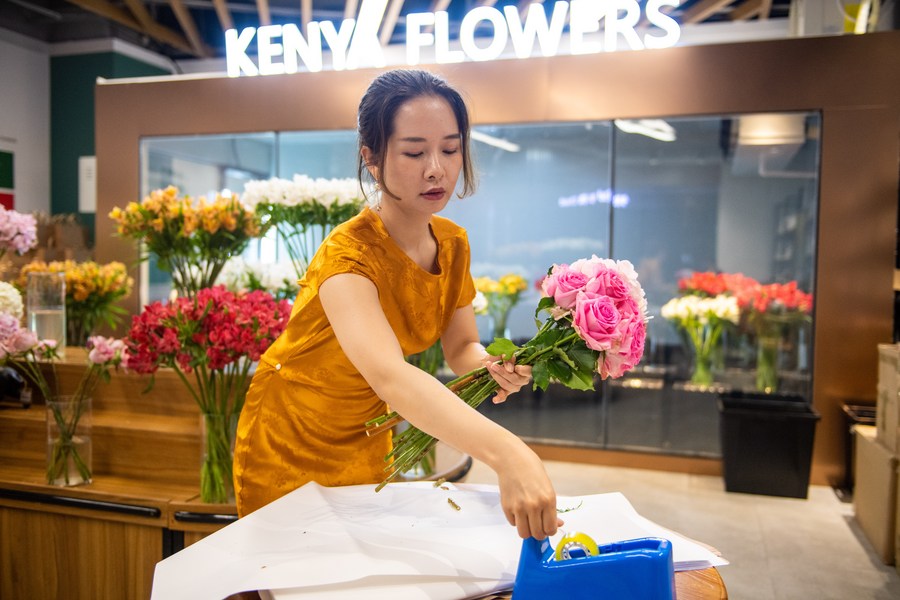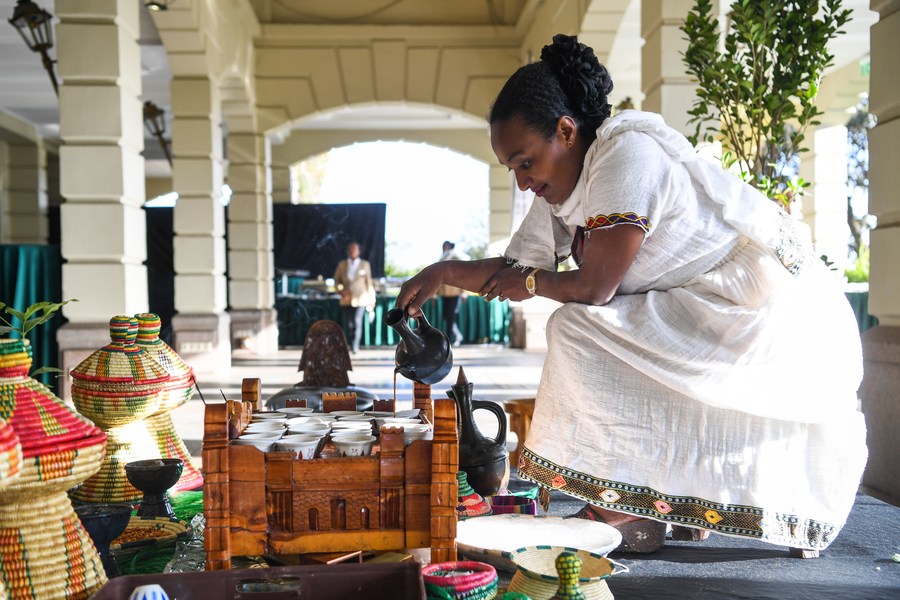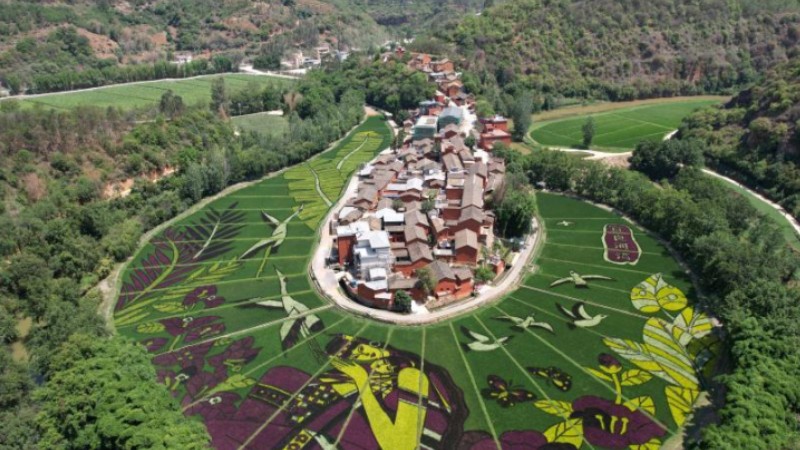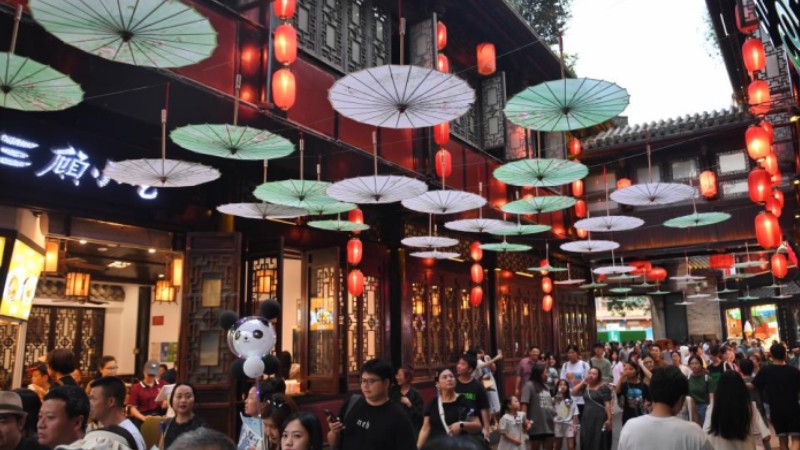African products blossom in China as cross-border trade thrives
CHANGSHA/NAIROBI, July 19 (Xinhua) -- At 1 a.m. Nairobi Time in a Kenyan flower farm, workers are busy cutting some of the world's finest roses, characterized by their large flower heads, diverse varieties and long vase-life.
An hour later, the roses are loaded onto trucks near Lake Naivasha and then make their way south along the Great Rift Valley to Jomo Kenyatta International Airport, in the capital of Kenya, a renowned global flower-producing country.
By 3 p.m. local time, they are already on a flight operated by China Southern Airlines, with their destination 8,700 kilometers away in Changsha, central China.
At 7 a.m. Beijing Time, the fresh-cut flowers lie in a laboratory of Changsha Customs after a 12-hour cross-continental flight, while customs staff meticulously inspect the sampled flowers.
The rigorous quality control measures on Kenyan farms, coupled with the establishment of a special "green channel" for African products by Chinese customs authorities, expedite the clearance process, which could conclude in as short as 30 minutes.
Eagerly waiting at the Gaoqiao Grand Market, Huang Zinan, chairwoman of Hunan Xiyue Culture Media Co., ltd., the importer of the flowers, exhaled a sigh of relief upon receiving the news of customs clearance, because she knows that it has only been a single day since the flowers were freshly picked, which means their quality will vie for more customers' attention.

Huang Zinan makes a bouquet with flowers from Kenya at the China-Africa Economic and Trade Cooperation Promotion Innovation Demonstration Park (Gaoqiao Grand Market) in Changsha, central China's Hunan Province, July 10, 2023. (Xinhua/Chen Sihan)
SURGING POPULARITY OF AFRICAN PRODUCTS
In recent years, the export of Kenyan flowers to China has experienced a consistent upward trend, propelled by factors including the establishment of direct flights between China and Africa and the optimizing of customs procedures.
Riding on the wave, the Gaoqiao Grand Market in Changsha has emerged as a prominent and thriving hub for the distribution of a wide range of African products within China.
The market, one of the largest comprehensive markets in China, houses a total of 9,100 merchants and was designated as the China-Africa Economic and Trade Cooperation Promotion Innovation Demonstration Park.
Being thousands of kilometers away from their hometowns, many African entrepreneurs are pleasantly surprised to discover that their domestic products are in vogue at the iconic wholesale market in central China.
From exquisite essential oils of Madagascar to coffee from Ethiopia, splendid arrays of high-quality and exotic African agricultural and food products have caught Chinese customers' eyes and ignited their urge to splurge.
Entrepreneurs from both China and Africa have sniffed out business opportunities from the new trends of consumption in the world's second-largest economy.
"Now more and more African entrepreneurs have come to establish their presence and do business in our market," said Jiang Shoufang, deputy general manager of Hunan Gaoqiao Grand Market Joint Stock Co., Ltd.
In 2022, the Gaoqiao market's trade with African countries reached 3.1 billion yuan (433.65 million U.S. dollars), with a remarkable growth of 302 percent compared to the previous year, serving as a testament to a new grand crescendo of decades-long Sino-African cooperation.
China has held the position of Africa's largest trading partner for 14 consecutive years. Along the way, China and Africa collaboratively advance the development under the Belt and Road Initiative, opening up new avenues for cooperation.
According to data from China's General Administration of Customs, the trade between China and Africa reached 822.32 billion yuan in the first five months of this year, representing a year-on-year increase of 16.4 percent.

An Ethiopian woman makes traditional coffee in Addis Ababa, Ethiopia, Feb. 13, 2023. (Xinhua/Michael Tewelde)
GREEN CHANNEL OF IMPORT
Excitement filled the air as boxes of imported African seafood, preserved with liquid nitrogen, were opened. On June 20, Gaoqiao Grand Market directly imported live seafood from Africa for the first time, including blue crabs from Madagascar and abalone from South Africa. In total, this shipment consisted of 3.5 tonnes of seafood, spanning 18 different categories from four African countries.
Su Junping, president of the Asia-Europe and Africa Joint Trade and Investment Promotion Association, said that China has effectively established a "green channel" for the import of African agricultural products, with an increasing number of categories being approved.
On June 29, China and African countries proposed the establishment of a liaison mechanism for sanitary and phytosanitary cooperation to strengthen the docking of inspection and quarantine standards and rules, through a joint statement issued at the China-Africa Sanitary and Phytosanitary Cooperation Forum held in Changsha.
African coffee, known for its high quality, has also made its way into the lives of Chinese consumers. Zhu Zhi, the business manager of Changsha Jiuxiu Coffee Co., Ltd. in Changsha, has noticed that sales of a particular kind of African coffee beans in his store have doubled compared to last year.
In 2022, the Gaoqiao Grand Market, where the coffee shop is located, achieved a coffee sales volume of 1 billion yuan, selling a total of 2,000 tonnes of coffee beans, with African coffee beans accounting for 40 percent of the total.

An exhibitor arranges African seafood products at the China-Africa Economic and Trade Cooperation Promotion Innovation Demonstration Park (Gaoqiao Grand Market) in Changsha, central China's Hunan Province, July 1, 2023. (Xinhua/Chen Sihan)
Yuhua District, where Gaoqiao Grand Market is located, has streamlined the entire process from direct sourcing in Africa to domestic processing, brand incubation and product sales. As a result, the overall cost of coffee is 30 percent lower than similar products in the Chinese market, Xiao added.
For an increasing number of African farmers and exporters, the booming Chinese market has become a boon. The emerging Chinese market holds the promise of higher and more stable income for African growers who have long relied on the European and American markets.
Mullege Coffee Export Private Limited Company (PLC) is a family-owned Ethiopian business engaged in coffee processing and export. Jemal Abrar, deputy manager of quality control at the company, said that his entire family makes a living from coffee farming and anticipates the popularity of their coffee in China.
"The coffee market in China has developed rapidly over the past decade. More and more young Chinese people are embracing coffee as a 'cool' beverage. We are very eager to tap into the Chinese market," said Abrar.
Photos
Related Stories
- 3rd China-Africa Future Leaders' Dialogue held in Beijing
- UN urges safe humanitarian access in Sudan as conflict lasts
- 18 China-Africa sci-tech projects inked in central China
- Zimbabwean president commissions Chinese-built lithium processing plant to develop mining industry
- China a credible partner for Africa, scholars say
Copyright © 2023 People's Daily Online. All Rights Reserved.









